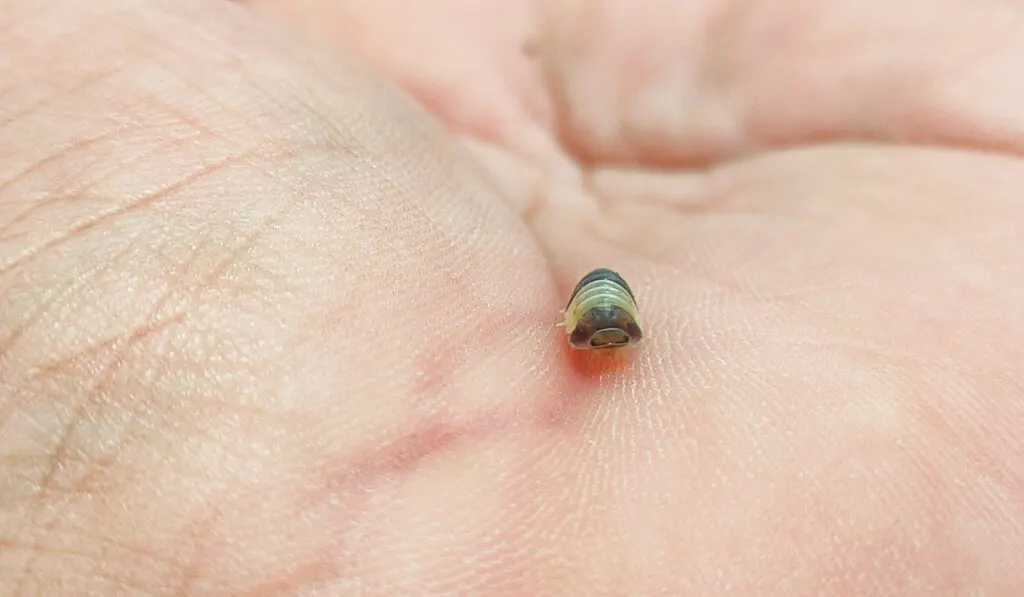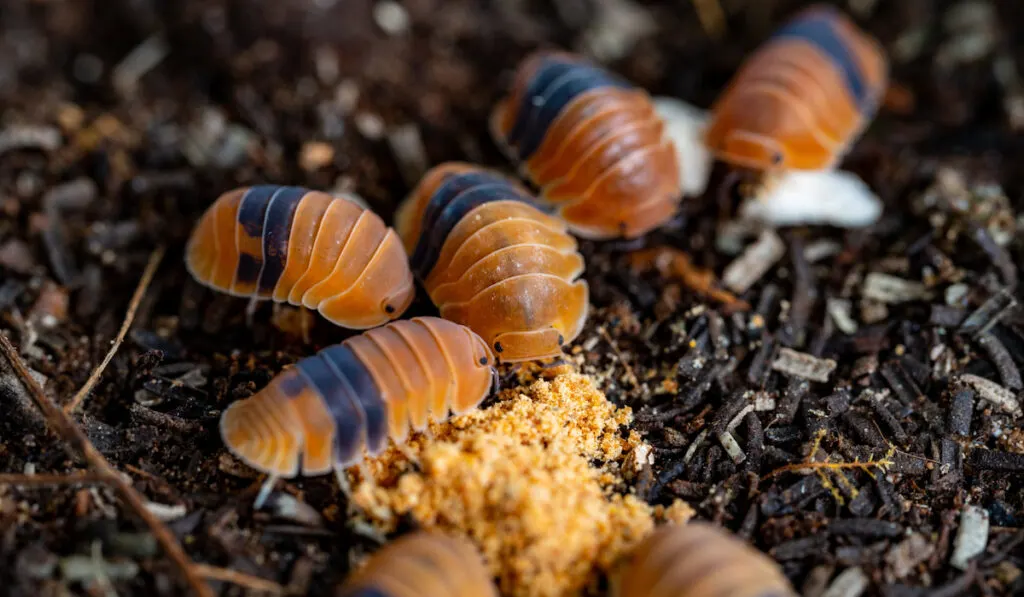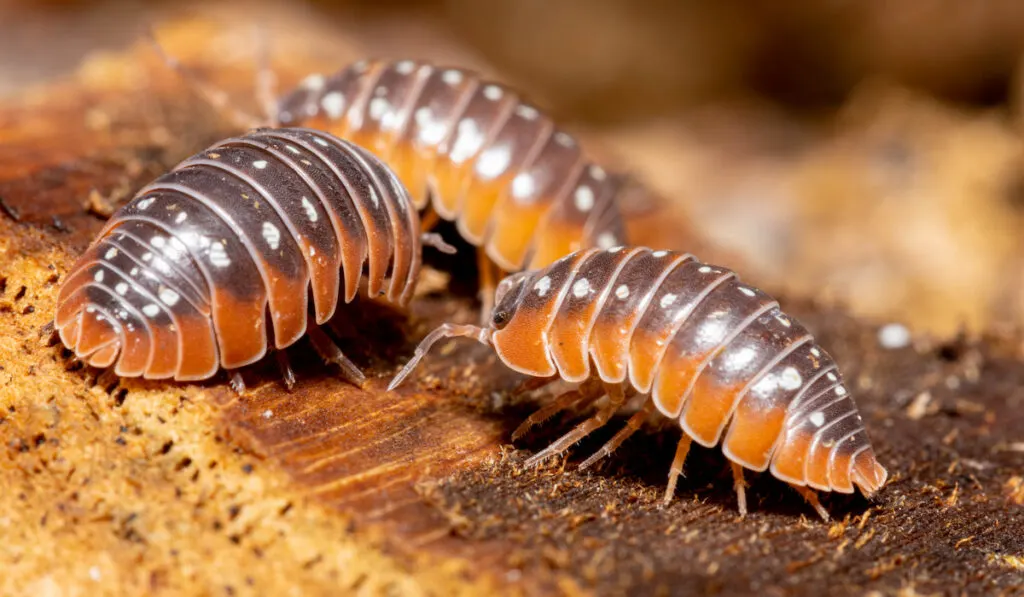Raising isopods is super easy and there’s no way you can go wrong, right? Well, it is easy to raise isopods, but as with anything, there are mistakes that can be made.
For example, you might wake up one morning to discover that your isopods are dying or are all dead. What could cause this?
Why are my isopods dying?
Even though isopods are easy to raise, they have their unique care requirements that if not met, can mean their death. You need to pay attention to the tank’s moisture, oxygen, and temperature.
Also, consider what you feed your isopods.
What are the optimum moisture and oxygen levels for your isopods? What type of food is bad for isopods? We’ll answer these questions and more in the rest of this article.

Table of Contents
Why Your Isopods Are Dying
There are a few reasons why your isopods are dying. Some common reasons are:
1. Predators in the Tank
Are the ventilation holes or net too porous and allowing predictors to get in? Predators such as centipedes and reptiles can eat your isopods.
If you cannot find any isopod in your tank and you see an open spot in the ventilation netting, there is a high chance that predators entered the tank.
2. Not Enough Moisture
Remember that isopods are crustaceans just like crabs, lobsters, and crayfishes. This means that isopods breathe with gills. Isopods receive oxygen from the moisture of their substrate.
If there is not enough moisture in the substrate, your isopods will not find sufficient oxygen to breathe.
When last did you mist your isopod habitat? How humid is the tank? If the humidity level is low, your isopods may die due to suffocation.
3. Too Much Moisture
Too much of anything can be bad. How can too much moisture be bad for isopods if they collect oxygen from it? Well, when their substrate is saturated with water (i.e. it is waterlogged), several biological processes such as fermentation will occur in the moisture.
These processes will deplete the oxygen of the tank and your isopods will try to crawl to the top of the tank.
Do you notice all of your isopods dying around the lid of the tank? How dry is your isopod habitat? Do not allow the substrate to become saturated.

4. Too Much Organic Matter in the Tank
Many people think that isopods are decomposers. Even though isopods aid the process of decomposition, they are scavengers or detritivores and not decomposers.
As detritivores, your isopods eat dead and decaying materials.
They do not decompose these materials directly, they only eat and excrete products that are easier for microbes to decompose.
What does this mean? It means that when you put in too much organic matter in your isopod tank, you will increase the number of decomposers (such as bacteria and fungi) in the tank. While this seems like a good idea, it is not because these microbes can harm your isopods when they are too numerous.
Do you leave uneaten food particles in your isopod tank for long? Have you seen mold growing in your isopod tank?
If you answered yes to either of those questions, you should remove the organic matter and try to renew the substrate.
5. Temperature
Isopods can grow well at room temperature. If the temperature gets too high, they can die off in the tank.
According to the temperature of the room, you should know how to ventilate your isopod tanks. If your room gets hot quickly, you should consider adding more ventilation.
Does the tank feel hot when you touch or open it? If so, it is too hot for your isopods.
6. Toxic Food
They say that isopods can eat anything. Well, whether they are correct or not, chemicals will kill your isopods.
When feeding your isopods with plant-based products such as leaves and fruits, you should make sure that these products are free from pesticides.
Did you change the feed or feeding pattern of your isopods? If you, you should review the type of feed that you feed your isopods.
7. Lack of Ventilation
It does not matter whether there is enough moisture in the substrate or not because if there is no proper ventilation, your isopods will suffocate. Ventilation helps gases such as oxygen and carbon dioxide to move freely in and out of the tank.
When there is no proper ventilation, you will see your isopods dying close to the top of the tank.
Now you know many reasons why your isopods are dying. What can you do to raise your isopods properly?

How to Properly Care For Isopods
Here are some essential care tips for isopods:
1. Housing
The truth is that you can raise your isopods in almost any type of tank. A 1-gallon tank (or bigger) is good enough for isopods. Do not place the tank under direct sunlight and make sure that it is not close to any heat source.
You should make sure that dim light (or indirect sunlight) can reach your isopods in their habitat. The lid should have a hole in the middle for ventilation. You can cover this hole with a net or mesh.
2. Feeding
A fun part of raising isopods is that you do not need to feed them. With proper moisture and oxygen in the tank, your isopods will eat the humus or mold growing in the tank. You can give them food sometimes, but make sure that it is not too much.
It is best to give your isopods plant-based foods such as leaves, seeds, fruits, etc. Make sure that their food is easy to break apart. It will help if you give them kitchen scraps or other materials that can quickly decompose. Do not feed them too often.
3. Substrate
You can use humus-rich soil as your isopod substrate or you can use cocoa coir/fiber amended with organic materials such as compost and food waste. The substrate should not be too heavy.
Do not use clay soil in your isopod substrate as it can suffocate them.
Also, make sure that there are no predatory insects in your isopod substrate.
4. Maintenance
Taking care of isopods is easy. The only major maintenance that you need is to always check their food and substrate. You should check for and remove uneaten food particles that are full of mold.
Also, when their substrate becomes too dark or fills with water quickly, you need to bring in some new substrate and remove part of the old.
5. More Essential Tips
Here are some easy care tips for isopods:
- Well-Drained Tank: To help prevent your isopod tank from becoming waterlogged, you should put rocks at the bottom of the tank before you add the substrate. Drill some small holes at the bottom of the tank so that water can drain off through them. Remember to mist the tank regularly.
- Wait Until Night Before You Conclude That They Are Dead: Even if you see lifeless bodies of isopods, you may not know if they are dead or not because isopods prefer to be active in the absence of light. Waiting until night comes will help you decide whether they are dead or not.

Related questions and answers
If you still have one or two questions about isopods, here are some answers:
1. Can You Revive Dying Isopods?
Unlike in the case of higher animals, it is quite difficult to revive dying isopods. You can prevent further death, though, by making sure that the moisture and oxygen levels of the tank are okay. Also, change their substrate and keep them in the right conditions.
2. How Can You Dispose of Your Dead Isopods?
So long as your isopods did not die of toxic food particles such as pesticides, you can feed them to your reptilian pets. It may be more difficult to feed dead isopods to spiders because they will not trigger the spider’s hunting instincts. You can also dispose of the dead isopods in your yard or a garbage can.
3. How Can You Dispose of Your Isopod Substrate?
Isopod substrate is nutrient-rich and you can use it to amend your garden soil. Throw the substrate into a garden. If you do not have a garden, you can wrap up the substrate and dispose of it in a trash can.
4. Why Should You Raise Isopods?
There are many reasons to raise isopods. For example, you can raise them to feed your reptilian and spider pets. You can also raise isopods for their nutrient-rich substrate for your plants. You can even raise isopods as pets. There are so many reasons.
5. Can You Raise Other Insects in Your Isopod Tank?
While you should not raise centipedes, praying mantises, and spiders in your isopod habitat, you can raise other detritivorous insects such as springtails and millipedes in your isopod tank. These insects have a similar care requirement with isopods, so you can easily raise them together.
Have you found your answer?
Final Thoughts
Even though isopods are easy to raise, you should make sure that the tank moisture and oxygen levels are just right for your isopods. Also, do not feed them with toxic food particles.
Don’t worry. Isopods need only minimum maintenance from you. Follow the tips in this article and you’ll be successfully raising isopods in no time.
